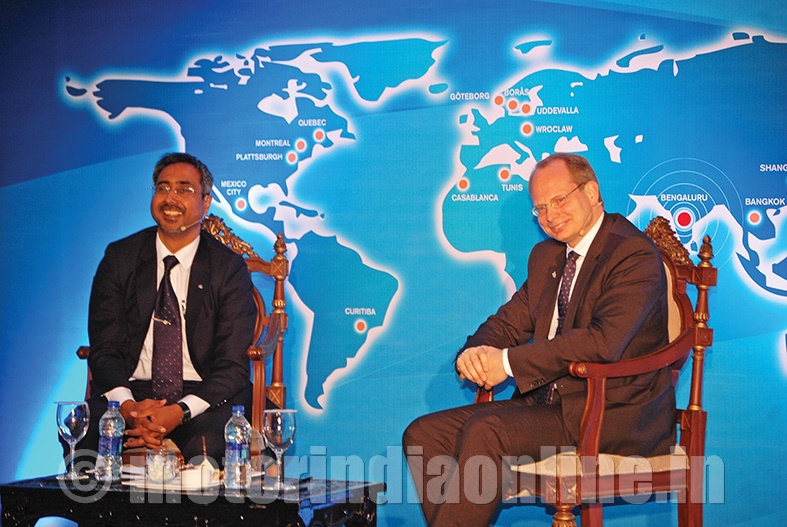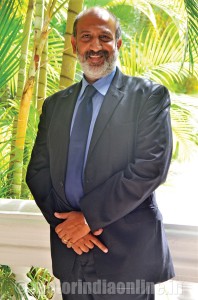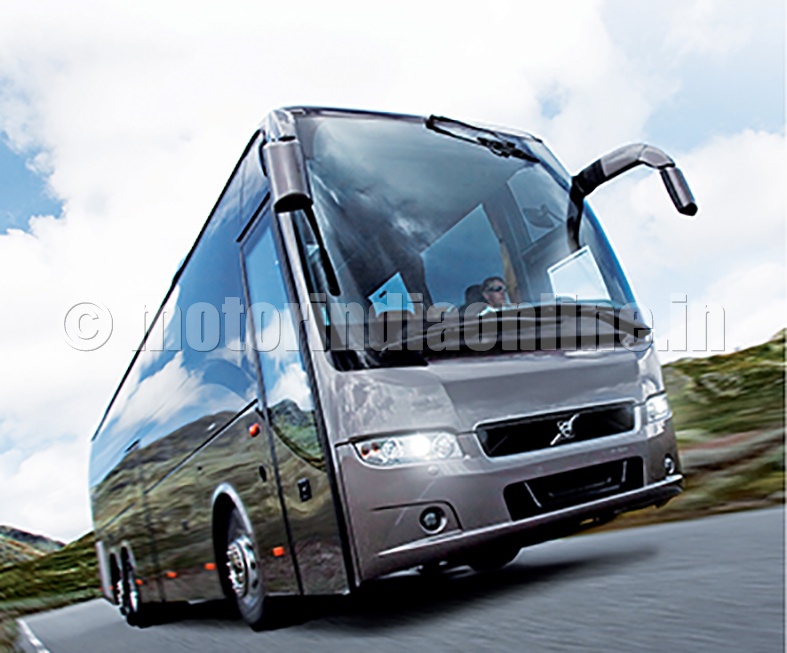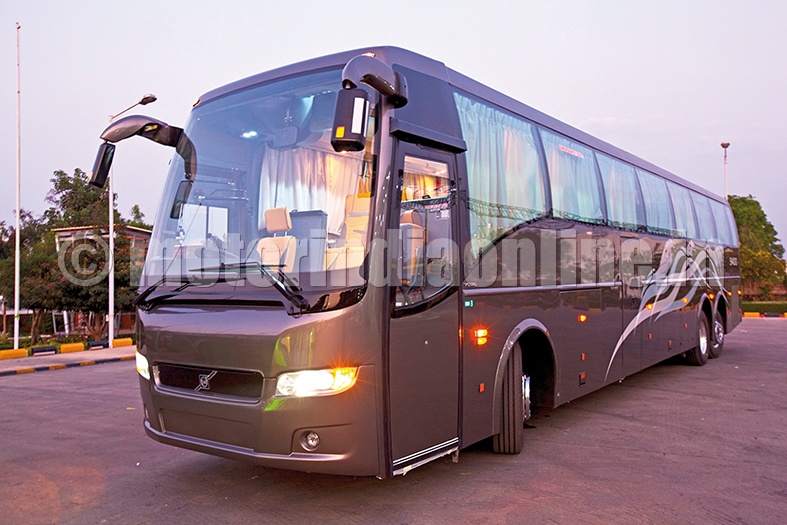A truly global presence means exchange of technology seamlessly and offering solutions to all. It also means coming together of teams despite their geographical positions and working together to bring ideas to reality. A case in point is Volvo’s ‘Made in India’ bus that will soon be exported to Europe. MotorIndia witnesses the official announcement.
Fourteen years of working on the Indian soil in the existing market condition and investing heavily in its processes has made Volvo’s Indian manufacturing base truly global. And now the company is ready to export its ‘Made in India’ inter-city buses to European customers by early 2016.
Mr. Hakan Agnevall, President, Volvo Bus Corporation, says: “We are the first bus company in India that makes this move using the competence and the supplier base that we have built up in Bangalore to deliver products to Europe.”
Natural progression
Since Volvo started working on its Asia Leverage Strategy in 2011, it has not only made investments of about Rs. 400 crores but has already exported buses from its manufacturing facility at Hoskote in Karnataka to the SAARC countries, Maldives and South Africa.

Mr. Passey explains: “We invested in and expanded our facilities by putting in more lines and processes primarily across the Volvo Production System, besides a new paint shop, a warehouse to house products for export. Most importantly, we invested on the training and skill development center to train the Indian team at Hoskote. We set up a new test track within the facility to perform the required tests for buses and trucks on the same test track. Our journey leading to exports began 4-5 years ago for which we set up an R&D center where today we have 50 highly qualified engineers who help us not only with our domestic requirements but also on our driveline as well as on the body parts of our products. Most of these investments were made in 2012.”
All this is not only geared towards exports but also works for the domestic market and is in complete alignment with the Government’s ‘Make in India’ concept.
Mr. Akash Passey, Senior Vice President – Region International, Volvo Bus Corporation, and Chairman, Volvo Buses, India, says: “We have been here for 14 years, and we have the first mover advantage in exports also with co-operation from the Volvo Group and Volvo Bus Corporation.”
According to Mr. Agnevall, the complexity of the European market as compared to South Asia or South Africa is much greater. The Asia Leverage Strategy of Volvo helps it to set up and utilize its manufacturing bases in India and China to cater to global markets.
A brand new bus model
The Euro VI-compliant Volvo inter-city commuter bus is a brand new model designed to run distances of between 100 and 300 km whose “annual volume in Europe is about 5,000 vehicles a year,” as Mr. Agnevall explains.

According to Mr. Passey, this translates into tough competition with big names already dominating the market like Daimler and Iveco. The bus body is mostly localized and the supply chain too comes in locally.
Mr. Agnevall adds: “Some of the Indian suppliers for this are already global suppliers to the Volvo system. And we have a couple of new Indian suppliers. We develop them to ensure that they are REACH-compliant, which is a European norm.”
In its bid to ensure a healthy share of the European inter-city commuter segment pie when it enters, Volvo has already worked towards bringing in potential customers – mainly operators –for an experience and feedback tour. Mr. Agnevall shares: “Part of developing this product involved engaging the customers early. We have very good feedback from many customers, so the product will be well received.”
Global platform
The universality of its production systems across the globe is what makes Volvo competent. The Managing Director, Volvo Buses India, Mr. V.R.V. Sriprasad, says: “It is a seamless global space of different manufacturing facilities which are on par with each other and different markets where different products are required. So whatever we deem fit to produce in any factory globally for any of the markets where we see an opportunity, we do that. So these buses come from a Volvo facility.”
Mr. Agnevall agrees, “in a global world, we develop a product with a global team sitting in different parts of the world.”
And stability plays a major role here. Mr. Sriprasad explains: “We had to stabilize our operations here. It is easy to buy a machine which we use in our Poland or Finland factory, but then the methods, the repeatability and the orientation of the people take time to build. And we have been working on it for the last couple of years and now are fairly confident that today we have a facility here which can cater to other markets beyond India.”
Besides, it is a well understood strategy to avail of the cost advantage that India offers along with utilizing its highly talented and efficient manpower.
Indian chapter
Volvo in India began primarily as a chassis maker and now has grown to building complete buses. With an installed capacity of around 1,500 buses it has been working towards export for a few years now. Mr. Passey says: “We have put in right processes, right supply chain for our products for export which automatically benefits the local market as well. And, depending on the needs domestically and internationally, we can scale up production of whatever is required.”
But it involves maturing of the local commuter and the local operator. As Mr. Passey puts it, “this product with Euro VI is good for Indian customers also, and whenever the regulation will change, we are ready with similar products.”
Offering a sustainable solution becomes easier when the market eco system also changes. Says Mr. Sriprasad: “We are ready to follow whatever policies are laid down. It is just that we want the eco system also to be ready in terms of fuel being available to be compliant with the global norms and also willingness of the people to pay because higher technology will result in higher unit costs. We cannot do anything in isolation, for it will come crashing down.”
According to company officials, Volvo is in talks with the Indian Government for adopting electric and hybrid buses and manufacture of such vehicles in the country. Of the many options available, two popular ones are electricity-run buses and bio-ethanol fuelled buses.
Mr. Passey remarks: “Some solutions have restricted application to a few hundred or a few thousand buses, whereas the annual volume of the Indian bus market itself is about 35-40,000.”
Mr. Agnevall, who is spearheading electro-mobility buses globally, shares: “The prevalent drive will be electro mobility. But there will not be only one technology.”
Volvo launched its electric hybrid bus a year ago, and its fully electric bus was out in Sweden a fortnight ago.
So, it is hoped that the Indian economy will brighten up and regulations become market-friendly, so that these dream buses start plying on Indian roads as well sooner than later.

